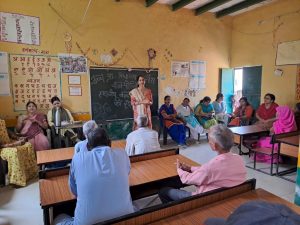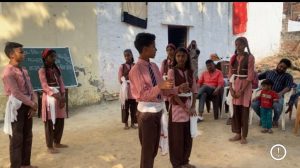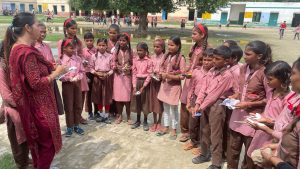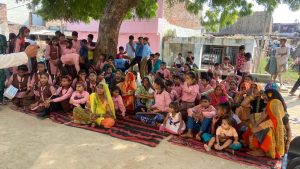By Rani Chahar, Assistant Teacher, UPS Balhera Composite, Akola, Agra, Uttar Pradesh

I am a subject teacher for English at an Upper Primary School in Balhera village in Agra district’s Akola block. Around 590 students are enrolled in our school, in grades 1 to 8. I came to know from the trainers of DIET, Agra, about this national level sustainability education program, Wipro earthian – Paryavaran Mitra, in 2020. It was during the Covid-19 pandemic. So, I joined the online training workshop organized by CEE. I felt that this is the program we needed in our school. I decided to work on the theme of sustainability and waste as it was closely connected to the situation in the village.
Our school is participating in this program for the past three years. After participating in this program, I have observed that it has helped our students develop an understanding of sustainability, and that too from multiple perspectives. Its activities have provided opportunities to engage students to learn and explore their local environment. These activities have also helped to build their knowledge, commitment and potential to meet the challenges of sustainability in their own spheres of influence.


This program has equipped me as a teacher, with new teaching tools and techniques. It has also been joyful for the students. On Saturdays, we organize various activities like group discussions, and competitions like essay writing, drawing, quizzes, and “best out of waste” and various other activities in our school. These help the students explore and act in academic contexts and in their own environment as well. Program activities undertaken during the school assembly have filled the students with great confidence and knowledge. Our students are often inspired to implement the knowledge gained in their day-to-day lives.
Students learn environmental concepts and use these in spreading awareness among the villagers through street theatre on cleanliness and waste segregation, and door-to-door communication, etc. This knowledge has reached among thousands of people directly or indirectly with the help of campaigns, mass media, social media and the school’s YouTube channel.
An interesting incident took place during a door-to-door awareness campaign. An elderly lady, asked the students about the profit/benefit they are getting from the process. It seemed to her that the government is paying some allowances to the teachers and the students for that task. By the end, we succeeded in making her and the neighbours understand the significance of sustainability and waste management. After around three weeks, when we encountered the lady again, we were much delighted to see her and others making compost from kitchen waste. Such positive stories have filled students and teachers with zeal and enthusiasm. We received state-level recognition for our work from in 2022. I am looking forward to furthering our efforts with the students.
